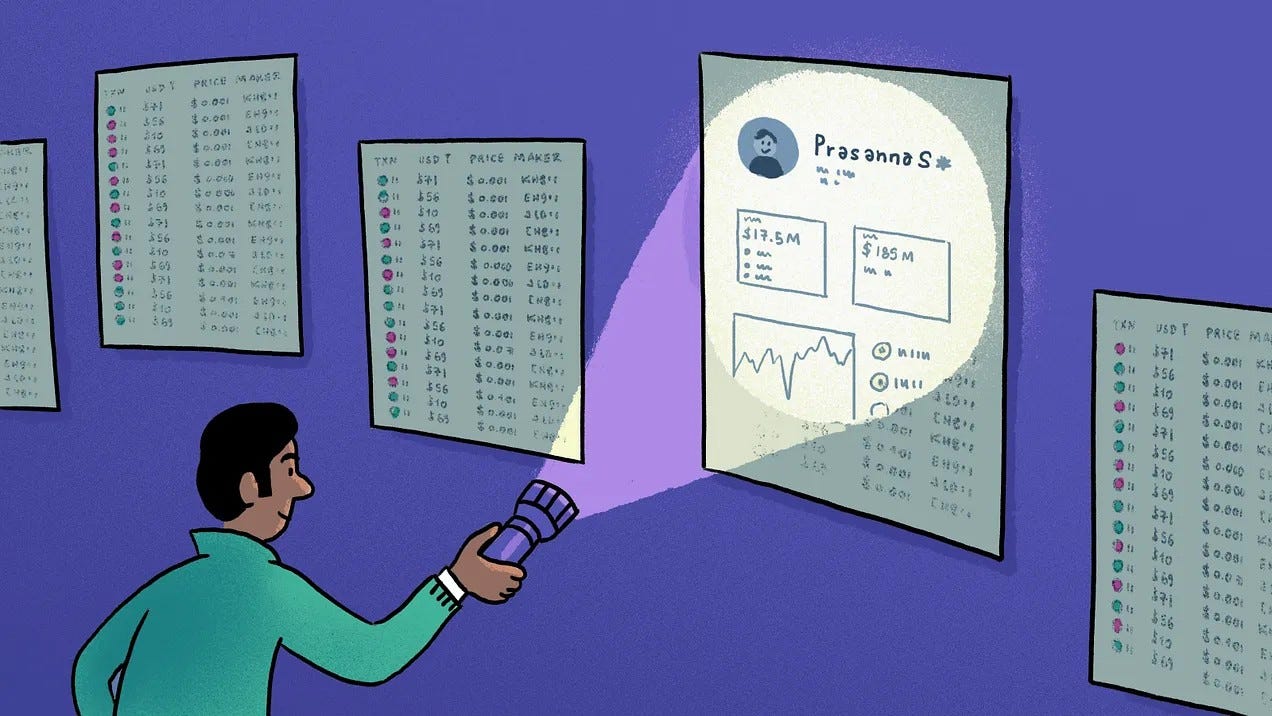The Social Network Growth Theory 📈
Hello!
Starting this week, every Saturday I will dive into a podcast by our partners at Decentralised.co and share what caught my attention.
This week, I'm reflecting on an episode hosted by Saurabh Deshpande, who explores Prasanna Sankar's journey from Microsoft engineer to crypto social network builder - a conversation that reveals how successful entrepreneurs actually spot and bet on paradigm shifts.
Listen to the full episode here.
"Growth kills all social networks."
I've been thinking about Prasanna's controversial thesis since I heard it. As contradictory as it sounds; the words stayed with me.
Prasanna co-founded Rippling, which provides a workforce management platform, now valued at $13 billion. Before that, he built 'Like A Little' that let users connect over shared interests.
It once boasted of having 20% market share among US college students before Facebook tried to acquire it for around $100 million.
He gives an interesting nightclub analogy in his podcast: “if you let everyone in, it’s not kind of cool anymore.”
The argument goes like this: social networks are all about creating exclusive behaviours that don't exist elsewhere. Let everyone in too quickly, and you lose the very thing that made people want to join. It's about preserving the unique social dynamics that emerge in smaller, more cohesive groups.
Past social experiments validate this theory.
Reddit succeeds because subreddits create natural boundaries - r/MachineLearning maintains different norms than r/relationships. Discord works because servers are invitation-only by default. These are conscious features and not bugs in their growth strategy. They preserve the community dynamics that make growth worthwhile in the first place.
Remember when Facebook was actually cool? When your biggest worry was getting tagged in a party photo, not whether your boss would see your weekend activities? The platform worked brilliantly for college students precisely because it was their space - messy, authentic, and gloriously free from adult supervision. Then Facebook opened to everyone. Your parents joined. Your grandmother started commenting on your relationship status. Suddenly, posting that 2am philosophical rant or sharing photos from last night's party was saved for Instagram (or the ‘gram or IG - depending on which point of the generational spectrum you relate to).
Clubhouse exploded to a billion-dollar valuation, then died precisely because it opened the floodgates too fast. The intimate, high-signal conversations that made it special got diluted by mass adoption.
BitClout tried the opposite approach - bribing users to migrate from Twitter en masse. Prasanna calls this the "big bang" strategy, and it failed spectacularly. You can't just clone existing behaviour and expect people to switch. The network effects of the incumbent are too strong.
But here's where I think Prasanna's insight gets really interesting: Farcaster seems to have cracked this puzzle by accident. They spent years growing slowly as a niche Twitter clone for crypto ideologues. Most observers wrote them off. Then they pivoted to frames and app distribution, creating genuinely new behaviour that couldn't be replicated on Twitter.
The key is figuring out a sequence. You need to establish unique behaviour in a small, committed group first. Only then can you scale without losing what made you special.
I see this playing out in 0xPPL’s strategy too. Instead of trying to get your mum on crypto social networks, they're building for people already doing scary financial transactions on-chain. The idea of creating a habit of casually sharing transactions would seem insane to normal people. But within crypto circles, it's already happening in a fragmented way through Telegram groups.
This makes me reconsider how we think about product-market fit in social applications. Maybe it’s more about "how do we maintain the conditions that created fit in the first place as we grow?" than "how do we get to product-market fit faster?"
The nightclub theory suggests that every social network has an optimal size or a user group beyond which its experience starts to decay. The challenge is to stay there long enough to evolve into something that can handle the next phase of growth.
Prasanna says: “Most founders optimise for growth metrics because that's what investors reward…”
But Prasanna’s lived on both the sides - the meteoric rise of Like A Little that couldn't sustain itself, and the patient building of Rippling that created lasting value. The difference was understanding when to accelerate and when to deliberately constrain growth. Perhaps he learnt it through his mistakes.
And, I feel this is true for products beyond social networks. Any product that depends on community dynamics — from marketplaces to developer platforms — faces similar trade-offs. The companies that figure out how to grow while preserving their essential character will have sustainable advantages over those that optimise purely for scale.
I will see you next week.
Off to weekend book-reading in my favourite park, now.
Prathik
Want to hear Prasanna's full argument and how it applies to Farcaster's evolution? The complete conversation includes his predictions for crypto social networks. Well, it was worth my weekend commitment.
Token Dispatch is a daily crypto newsletter handpicked and crafted with love by human bots. You can find all about us here 🙌
If you want to reach out to 200,000+ subscriber community of the Token Dispatch, you can explore the partnership opportunities with us.
Fill out this form to submit your details and book a meeting with us directly.
Disclaimer: This newsletter contains analysis and opinions, not financial advice. Trading crypto involves substantial risk - your capital is at risk. Do your own research.




